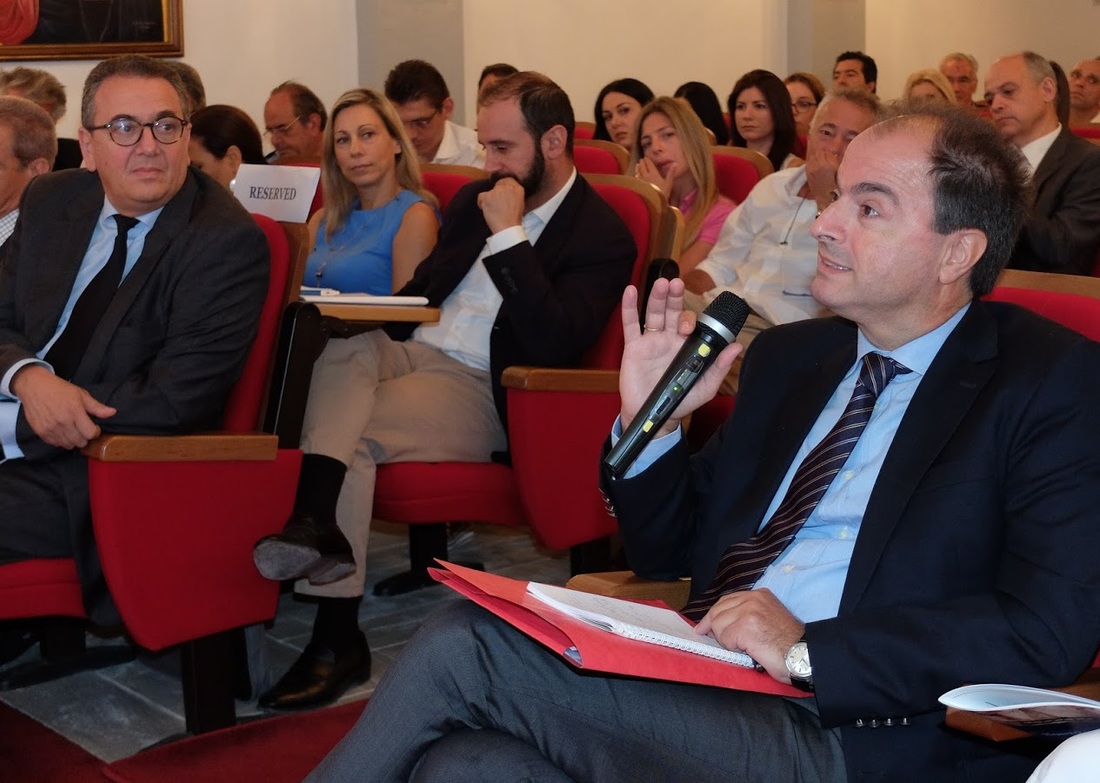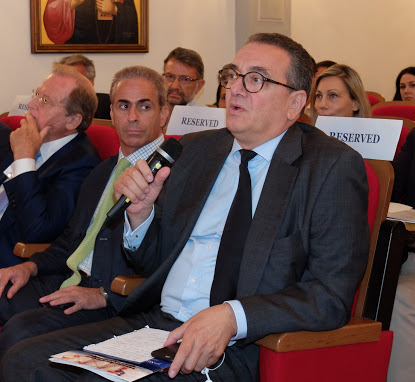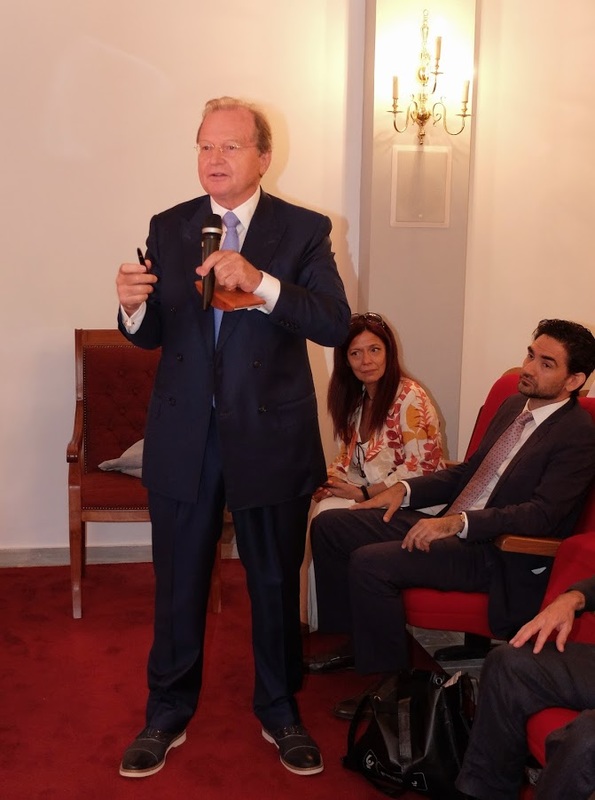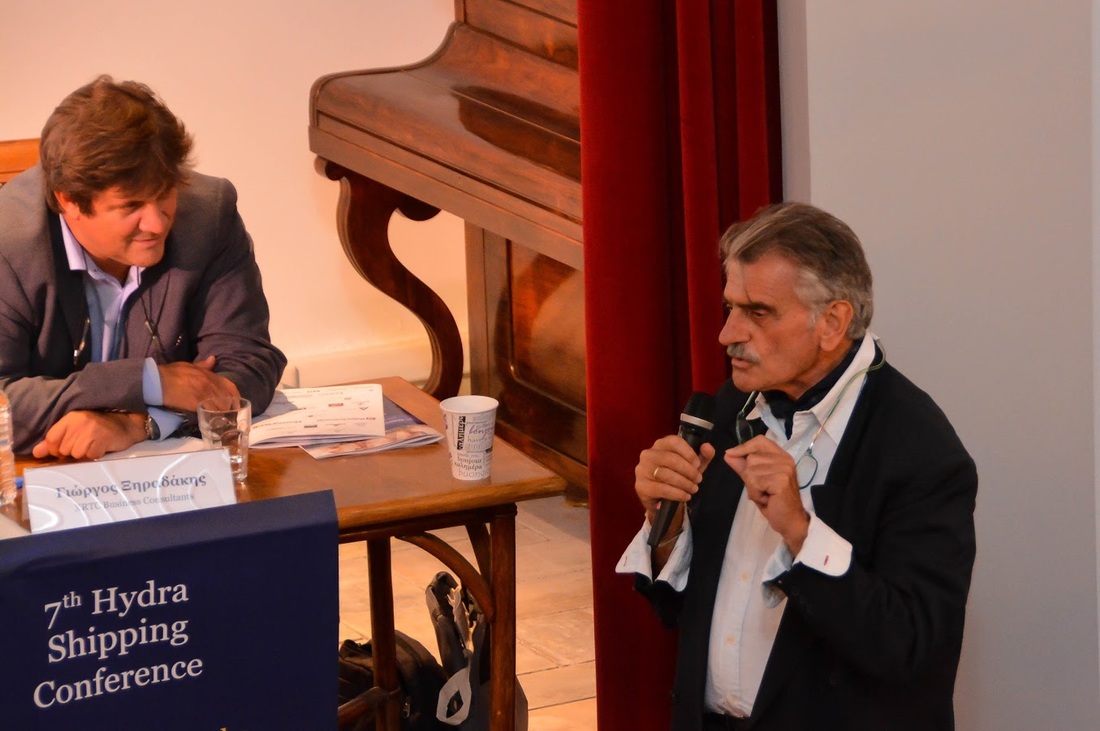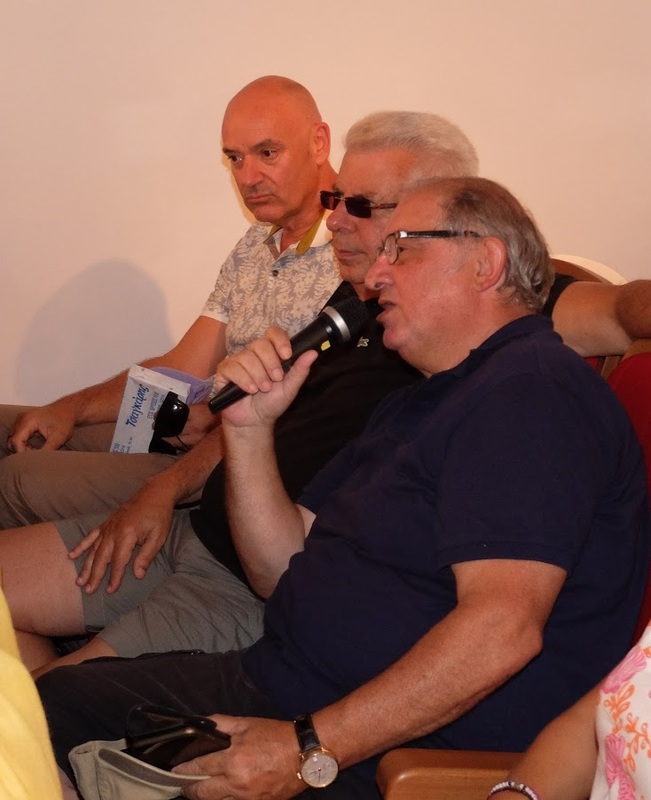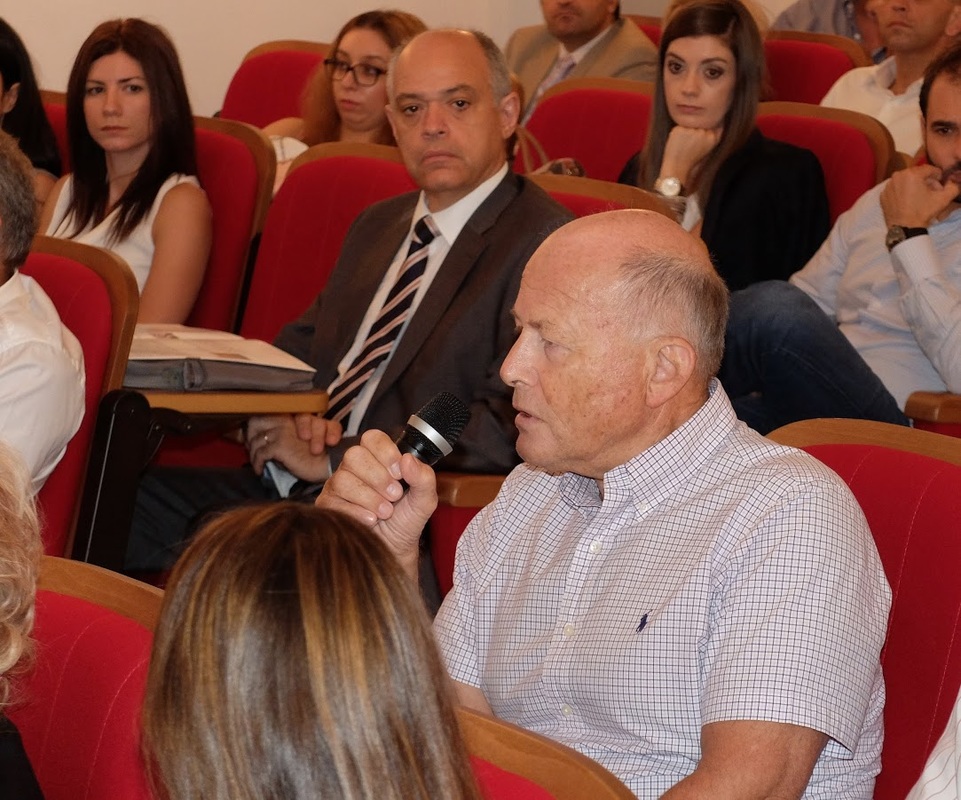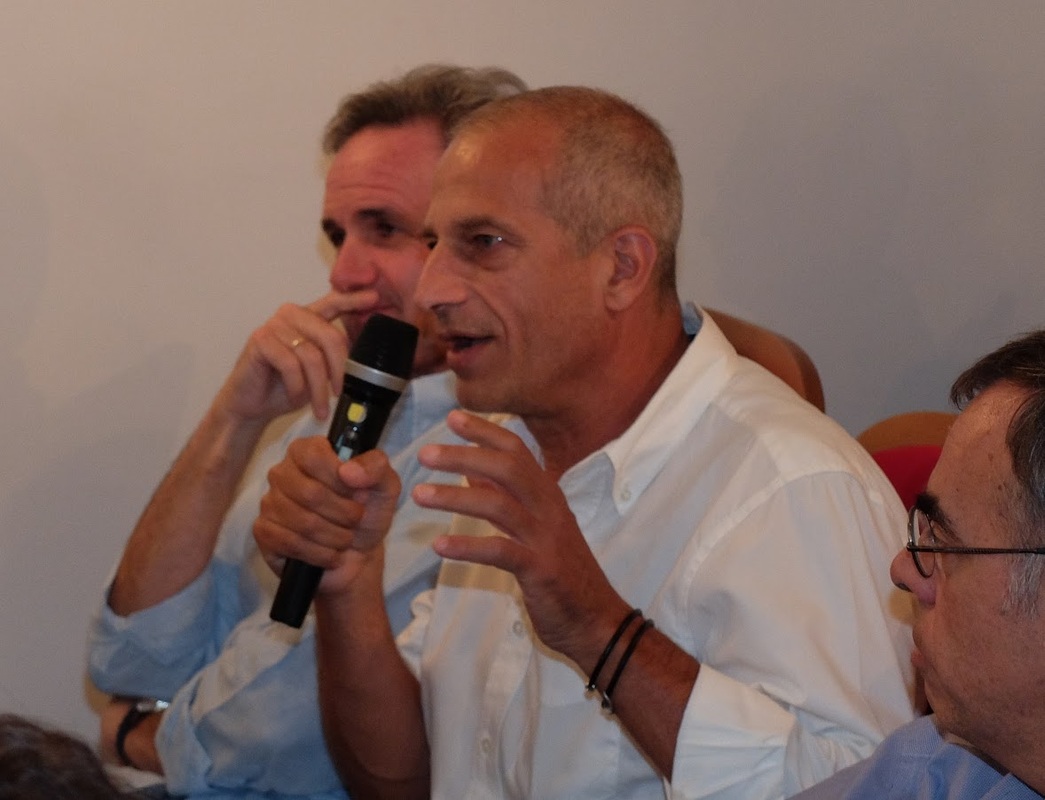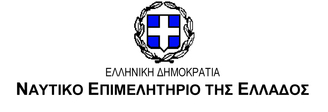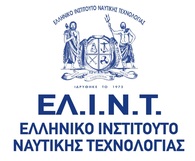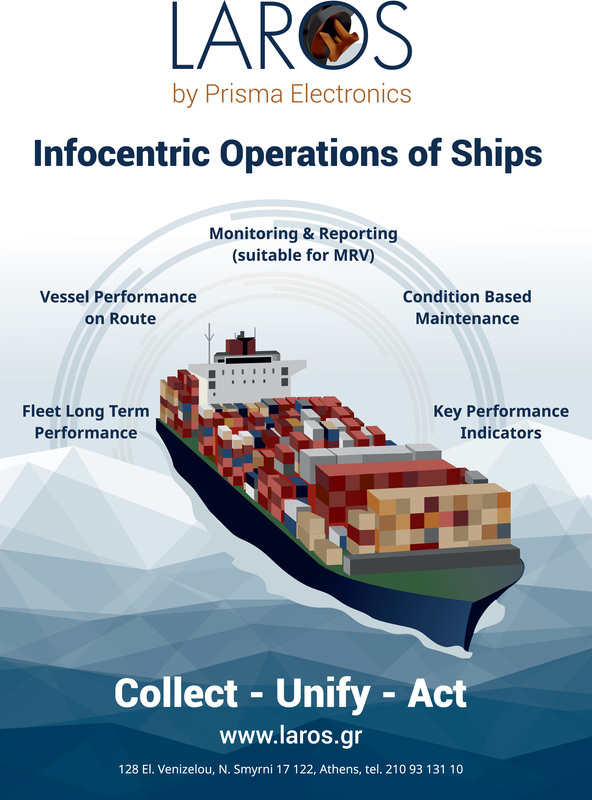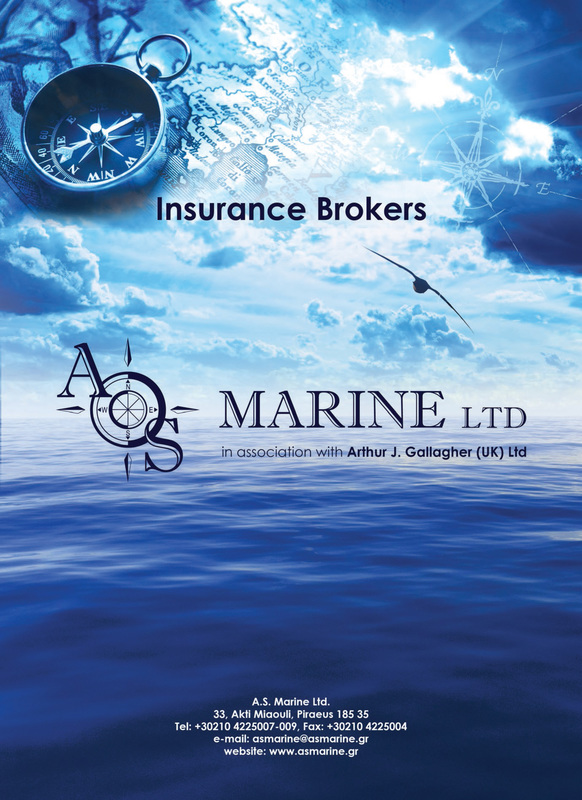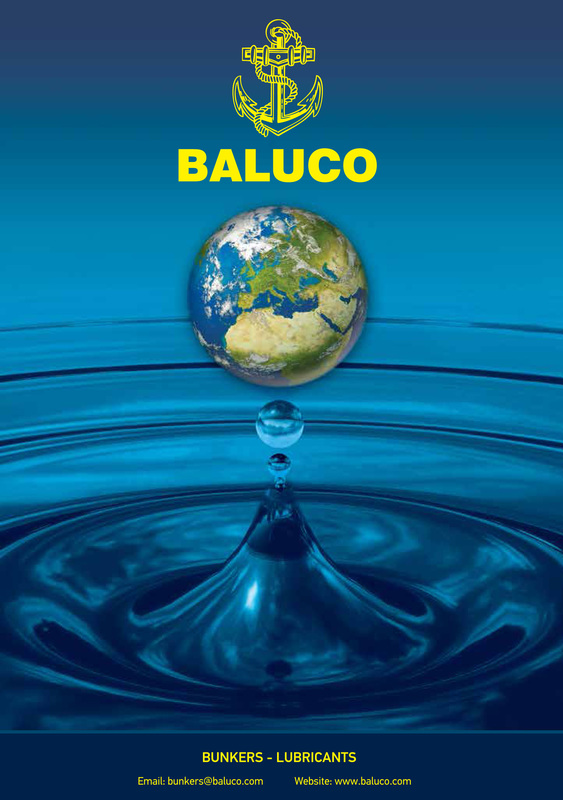The Fraternity of the Athenian Hydriots
Established in 1890
7th Hydra Shipping Conference
From the "brig" to the autonomous ship
Saturday, September 17th, 2016
Conference Hall of the Hydra Holy Cathedral
Greek shipping has the potential, knowledge and experience to adapt to the rapidly developing technology. This was the main conclusion of the 7th Hydra Shipping Conference, entitled: “From the ‘brig’ to the autonomous ship”. The conference, organized by the Fraternity of the Athenian Hydriots, took place on Saturday, September 17th 2016, in the Conference Hall of the Hydra Holy Cathedral, under the auspices of the Greek Ministry of Maritime Affairs and Insular Policy, the Hellenic Chamber of Shipping, and with the support of the Hellenic Institute of Marine Technology (H.I.M.T.), the Association of Banking and Financial Executives of Hellenic Shipping, the International Propeller Club of the United States – International Port of Piraeus and of WISTA Hellas. Greek shipowners, distinguished members of historical Hydriot families, senior business executives working in the shipping industry, representatives from IT companies, consultants and academics, attended the conference.
The Brig ships and Hydra
A Brig is a sailing vessel with two square-rigged masts. From 1757 to 1821 Brigs were exclusively used as freighters. However, during the Age of Sail, Brigs were seen as fast and maneuverable ships and were used as both naval warships and merchant vessels. They were the main warships of the revolution against the Turks and they were the last of the great warships and the strongest after the Corvette. Brigs were especially popular in the 18th and early 19th centuries.
The Greek Brig proved in practice suitable for fights against pirates and to break the blockade of the British warships during the Napoleonic wars. They were 30 to 35 meters long, their displacement varied from 200 to 500 tons, they were equipped with 18-20 artillery guns of 12 to 18 liters, all over the deck and the crew consisted of 50 to 80 men. Hydriots were the first who build Brigs. The first Brig that was built empirically, was built by A. Kokkini’s in 1757, 250 tons, with stern similar to the bow.
The Hydriot captains, over the years of the 18th and especially the 19th century, had the potential to invest in the best way their funds to the oldest and more profitable industrial production era: the construction of ships and sea commerce. Data from the Hydra files reveal that in 1812 Hydra had a commercial fleet of 106 large ships with different flags and 27 smaller ones, among which many Brigs. Hydriot freighters were transporting goods not only to the European markets, but also to markets outside the Mediterranean sea.
A Brig is a sailing vessel with two square-rigged masts. From 1757 to 1821 Brigs were exclusively used as freighters. However, during the Age of Sail, Brigs were seen as fast and maneuverable ships and were used as both naval warships and merchant vessels. They were the main warships of the revolution against the Turks and they were the last of the great warships and the strongest after the Corvette. Brigs were especially popular in the 18th and early 19th centuries.
The Greek Brig proved in practice suitable for fights against pirates and to break the blockade of the British warships during the Napoleonic wars. They were 30 to 35 meters long, their displacement varied from 200 to 500 tons, they were equipped with 18-20 artillery guns of 12 to 18 liters, all over the deck and the crew consisted of 50 to 80 men. Hydriots were the first who build Brigs. The first Brig that was built empirically, was built by A. Kokkini’s in 1757, 250 tons, with stern similar to the bow.
The Hydriot captains, over the years of the 18th and especially the 19th century, had the potential to invest in the best way their funds to the oldest and more profitable industrial production era: the construction of ships and sea commerce. Data from the Hydra files reveal that in 1812 Hydra had a commercial fleet of 106 large ships with different flags and 27 smaller ones, among which many Brigs. Hydriot freighters were transporting goods not only to the European markets, but also to markets outside the Mediterranean sea.

In his welcome speech, the President of the Fraternity of the Athenian Hydriots, John Sahinis, referred to the conference which, due to the uninterrupted substantial support of all those participating in it, has become not only an important annual event, but also a high-level discussion forum for the shipping industry. He also referred to the contribution of the Fraternity. The Fraternity was established in 1890, by the historical Hydriot shipping families that led the sea battle during the 1821 fight against the Turks, offering their 186 ships and all their fortune for that cause. They were aiming at the preservation and promotion of Hydras’ contribution to the liberation from the Turkish occupancy, the development of significant charity activity, and attracting the young people to the maritime professions. The Ship Owner and Member of the Hellenic Parliament Gkikas Koulouras, who was the Fraternity’s President from 1938 to 1954, was the initiator and co-founder of the "Union of Greek Shipowners", a union which, this year, celebrates 100 years of operation.
Mr. Sahinis mentioned that for the first time the Conference had been hosted in the Conference Hall of the Hydra Holy Cathedral, where Hydra’s Ecclesiastical Museum is also hosted. In the courtyard, the participants of the conference could see the busts of eminent Hydriots, such as Lazaros Kountouriotis and Andreas Miaoulis. The Conference Hall had been renovated in 2011 and is audio-visually fully equipped. The President of the Fraternity mentioned that the subject of this year’s Conference was “From the ‘brig’ to the autonomous ship”, with focus on the digital transformation of the shipping industry. He called the distinguished speakers of the conference to develop their views in a productive dialogue and guide the attendants in a tour from the Brig to the autonomous ship. 
The Mayor of Hydra, Dr. George E. Koukoudakis, welcomed all conference’s distinguished guests to the island of Hydra, an island with significant shipping tradition in which the oldest in the world naval academy was established and is still operating, an island which is the benchmark of the maritime competence of our country. Hydra’s maritime competence was turned into naval power and was the main pillar of our national liberation fleet. The Mayor concluded by thanking the President of the Fraternity of the Athenian Hydriots for the establishment of such a prestigious conference and he also congratulated the organizers for the choice of the subject of the 7th Hydra Shipping Conference, since the technological developments in the shipping industry result to domino effects in other sectors, such as geopolitics.
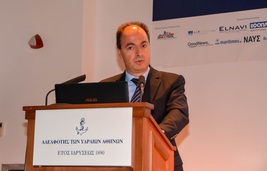
Professor Ioannis Theotokas, Secretary General of Maritime Affairs and Insular Policy, in his speech presented the evolution from the traditional to the modern, technologically advanced ship. He mentioned the uninterrupted development of the fleet in terms of both number of ships and tonnage during the last four decades, which makes Greek-owned shipping a unique case in the history of modern shipping. To preserve their competitive position in the years to come, Greek-owned shipping companies will have to confront various challenges. The ability to renew and expand the human capital and the knowledge basis of the industry should be one of their first priorities. To succeed in this, it needs to attract, train, provide life-long career schemes and retain young people to the industry. In this perspective, the development of a competitive Maritime Education and Training sector is a precondition. The economic crisis and unemployment has highlighted the career prospects provided by the shipping industry. This has led to the increase of the number of candidates for the Marine Academies and the recruitment of qualified young people. The challenge for the industry, after the completion of their studies, will be their sustainable professional development and their retention in the profession.
For the vast majority of the seafarers, especially for Generations Y and Z, the availability of Internet access and social media applications on board ships is a critical factor that would prompt them to extend their service on a vessel with such amenities. Based on the above, communication is a factor that contributes to improving retention in the seafaring profession. Beyond the HR function, if companies have good and accessible communication facilities in place, this could have the potential to improve the overall operational efficiency of shipping companies not only by reducing personnel costs or the cost of recruiting and training a new employee, but also by gaining efficiency in other areas such as control or management systems. Sustainable development of the fleet asks for expansion to other types of innovation, based on the ability to create, exploit and integrate the technological evolutions in the product development process. In other words, to transit from the organizational innovation to the product innovation, based on the technology development. Concluding his speech, Prof. Theotokas said that technological development is the way out for the future. However, it is the necessary, but not the sufficient condition, for success. This is because competitors with better prospects for investing in developing new technologies are about to appear. What is equally important, and somehow the precondition for the exploitation of the advantages of technological developments, is the solid basis that human resources offer. Thus, investments in technological developments should go hand in hand with investments in human resources. 
The President of the Hellenic Chamber of Shipping and Managing Director of Aegeus Shipping S.A., George D. Pateras, mentioned that Hydra, as well as Oinousses, his ancestral island, are both pillars of the Greek Maritime tradition. Hydra is 3,5 times larger than Oinousses, and is inhabited by approximately 2.000 people, while Oinousses is inhabited by less than 800, thanks only to the Boarding school and the Deck officers’ college. This is yet another similarity between the two Islands, the fact that both have outstanding Naval Academies. Of course, the Hydra Academy claims to be the first, founded in 1749. Mr. Pateras wondered what all graduates of Greek Maritime Academies would say if questioned about smart shipping and what the future holds for them. They have been educated to be smart mariners to use modern technology to their benefit, both for efficiency and safety.
Advancements in technology reply to necessity, and if properly used, may contribute to environment protection and enhance safety. “We can rely on their benefits as long as we don’t forget our basic training and learn to use these advantages, as a tool to assist us in doing a better job. Safer for the seaman and our environment, thus increasing reliability and consistency for a better outcome of any adventure”, said Mr. Pateras, adding: “Let us not forget that Greek Merchant Shipping flourished for decades with second hand vessels which many considered to be technologically inferior or even obsolete. Greece has historically been in the forefront of technological advancement; nothing has changed, we are still the forerunners of the digital world. I firmly believe that the Greek seaman and the Greek shipowner are both knowledgeable and flexible and will welcome modernization and adapt easily into the reality of a digital future”. 
George C. Xiradakis, Managing Director, XRTC Business Consultants, President, The International Propeller Club of the United States-International Port of Piraeus, chairman and moderator of the conference, made a short introduction of the debate, entitled “Is Smart Shipping smart?”, saying that Smart Shipping business can be adopted by the existing companies in the industry for the sake of increased productivity, security, etc. However, this adaptation could be very difficult, if it would prove very complicated, cost spending or not taking into consideration people working in vessels. He mentioned that every change should be designed and implemented in a way that can be adopted by the workforce of shipping industry today.
Mr. Xiradakis introduced the two speakers of the debate on stage, Dr. John Coustas, President & CEO, Danaos Corp., and Dr. Martin Stopford, non executive President, Clarkson Research Services Ltd.

Dr. Martin Stopford said that major improvements in Information and Communications Technology (ICT) make a new business model viable. The “Smart-Shipping” model uses ICT based innovation to achieve a major improvement in global transport service and efficiency. It focuses in three areas – Smart-Ships with improved operating systems; Smart Fleet-Management which manages a fleet of ships like a “factory” producing more efficient transport; and Smart Shipping-Logistics which integrate sea transport into the door-to-door logistics train. These innovations can create wide-reaching improvements in global transport value creation in the form of safety; Personnel development; improved service levels, and lower inputs and emissions.
The “Smart Ships” will need to become digitally ready, in the same way as has happened with office buildings on land – server facilities and wireless LAN access throughout the ship are the main items. Retrofitting a fleet of 86,000 ships, with 6,000 companies and an expected life of 25 years will not happen quickly. Meanwhile the digital integration of maritime infrastructure needs to be developed. This is already happening for charts. Ports will need transport management systems dealing with pilotage, berthing and cargo management. Again this is already happening, as is the tracking of containers. But the big changes in Smart Shipping will come in transport system innovation. The core will be the move from the ship as the business unit to the fleet as a transport factory, with links to customers and suppliers. The key word is "evolution", preferably within a "protocol" framework. The benefits of this sort of business development often fall outside the normal accounting framework, making it difficult for managers to demonstrate the systemic benefits which will result from any proposed change. Some of these systemic benefits are: 1. Fleet economies of scale, greater professionalism, effective QA systems and fewer defects. 2. Fewer accidents and unplanned breakdowns lead to higher performance benchmarks and fewer disputes. 3. Better use of assets as management make better informed fleet decisions. 4. Better performance monitoring and reporting (less paper) against realistic benchmarks. 5. “One company” culture, group wide communications, teamwork and better career progression.

Dr. John Coustas mentioned that, historically, shipping is an industry that has faced the effects of the technological change. When we moved from sailing ships to steam ships, many shipowners vanished, because instead of investing in new technology, they preferred to invest in even larger sail ships. Greek shipping community has been successful for many years, because it managed to exploit new possibilities and timely adapt to them. Many other shipping companies, namely in Scandinavia and elsewhere, did not follow these changes, and vanished.
Technology helped us to automate various procedures on board. It also gave us the potential to employ people in a more productive way. Today’s ship becomes an extension of the office. However, there is also a problem here; the fact that we are able to move the ship so close to the office, made people less assertive. The ability to find solutions is now gradually diminishing. People on board feel closer to the office; however, their ability to take decisions on board decreases. It is also true that we have moved in a more complex and bureaucratic environment on shipping. A captain spends most of his day in administering all regulations, papers etc. Information technology is a necessary solution for us to keep up with our requirements, to do our job properly. Finally, it is very important to use IT, not as a tool that takes responsibility away from the vessel, but as a tool to give the vessel more information to take responsibility. The advent of big data is to give correlations and information that we could not have up to this moment.
Coffee Break
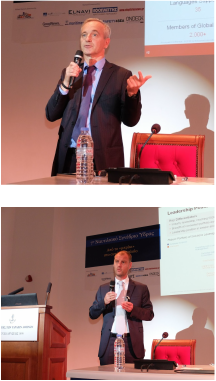
After the coffee break, Bertrand Collongy, Region Sales Director South Europe, Israel, Russia & CIS Countries Workflow Solutions, Honeywell Sensing & Productivity Solutions and Yann Lepage, VP Sales EMEA, Mobility & Workflow Solutions, Honeywell Sensing & Productivity Solutions, made a presentation entitled: “Voice directed work: bring your operation efficiency to the next level”. Vocollect M&I technology introduces a ‘Hands-Free, Eyes-Free’ environment and enables leading businesses to elevate their documentation and compliance to levels never before attainable. Vocollect M&I innovative solution saves time and reduces costs, by helping the user conduct a faster inspection and maintenance process. Honeywell also provides hardware, network and applications that work together to deliver a cost-effective, integrated approach for tracking and monitoring vehicles, cargo, vessels and heavy equipment anywhere in the world. Yann Lepage presented for the first time the UniTracker, a new portable satellite tracking device, which can be paired to an iPhone to utilize a satellite messaging service. It offers an affordable two-way communication, tracking and alerting for lone workers and maritime fleets across the globe. New Holders will be designed to be compatible with different phone models. Honeywell guests were invited by Mobile Technology who is Honeywell Platinum Partner in Greece.

George Christopoulos, Vice Admiral of the Hellenic Navy (Rtd), Marine Operations LAROS-Prisma Electronics, made a presentation entitled: “Infocentric Operations on Ships”, saying that today’s ships are equipped with numerous sensors and advanced systems which help to operate vessels more efficiently. However, the data produced onboard are unreliable and far from being utilized to their full extent. Interoperability is not on the table yet. Thus, there is no longer viable way to manage ships through disconnected platforms driven by unreliable data from ship legacy systems. A new approach is needed for managing ships and operations based on one interconnected system driven by reliable data.
LAROS is an open architecture platform that enables the ability to utilize data and obtain actionable knowledge, predictions and insights, allowing continuous process improvements that result in optimal performance throughout the lifetime of assets. It is the bridge between the vessels and their systems and onshore enterprises resources. The ability to manage all data and information from different systems onboard in a safe and efficient manner enables a new level of possibility to analyze and monitor situations, critical operations, to adverse conditions and to increase performance awareness. Very interesting views were expressed as well, during the panel discussion about “The digital transformation of the shipping industry".

Αthina Vezyri, Chairwoman, SRH Marine Greece, VP Maritime Sales, Europe and MSS Services, Speedcast, Director, Comité International Radio-Maritime (CIRM), mentioned that the main reason why we are now more eager to use modern communication technologies, is that the relevant cost is lower, due to the new generation of satellites and to the fact that internet connection costs have diminished and have become similar to what we are paying for internet at home. This moment every vessel receives huge amount of data. We have to evaluate and monitor these data; we have to develop tools that will make the information simple and ready for use from the crew. Even if we have all those tools available, we still need data entry, which means we still have to educate our people for this purpose.

Μichael Bodouroglou, President & CEO, Paragon Shipping and Box Ships, said that during his 35 years of experience in the shipping industry, he has seen a basic trend; modern ships are becoming more technologically advanced, more complicated. However, people who work on ships have not become more educated. Moreover, regulations have become more complicated, instead of being simplified. Greek shipping is successful due to its ability to adapt and change, in a cost-effective way. Technology will continue to improve, but the decisions will continue to be transferred from the vessel to the office. The pace of this change and the ways it will be implemented will make the difference between success and failure for all of us in the future, in the competitive world that we operate.

Dr. Κonstantinos Poulis, General Manager, Epsilon Hellas, expressed a number of questions, regarding the digital transformation of shipping: What strategic decisions (e.g., organizational design and investment) must be taken towards a radical industry transformation? Is the legacy of traditional shipping firms an enabler or constraint in light of the digital transformation of the shipping industry? Is there a threat of new entries and if yes, where will these come from? Who will have access to critical resources and how? Mr. Poulis said that the challenges Greek shipping industry would have to address are mainly financial, technical, legal, social, as well as challenges concerning safety, insurance, maintenance and risk & reliability issues.

Αndreas Vamvakaris, Treasurer, Hellenic Shortsea Shipowners Association (ΕΕΝΜΑ), mentioned that the adoption of new technologies should be a matter of cost versus benefit assessment. The Shipping industry needs medium to long-term changes (improvements in the fields of machinery management, navigation and route planning, ballast management, trim management & cargo management). Incorporating cutting-edge technology, such as monitoring through satellite connectivity in cooperation with the manufacturers the engine and subsystems of vessels, could be very helpful. In addition, using 3D printers on ships for manufacturing consumable parts would save substantial time and money for vessels. Mr. Vamvakaris concluded that, although the shipping industry faces systemic challenges, the widespread adoption of new technologies is a matter of time. However, the integration of these systems will be slow. The requirements for successful transition of the industry are the availability of funding, the qualified staff, and the vision for the new era.

George Α. Τsavliris, Principal, Tsavliris Salvage Group, mentioned that although we are trying to adapt to new technology, we could not substitute the human being, as humans find solutions. Especially for the Greek shipping community, there is a Greek word, called “leventia”, which refers to the ability of resolving problems and has nothing to do with computerization. The name of the game for the last 15 years has been under-regulation, now we are facing over-regulation and over-information. We have a ship going at sea now, with GPS, two radars etc., but you also have the man on the bridge with binoculars, who watches the sea 24 hours a day and this person cannot be replaced by a computer or a radar.
End of Conference
Lunch
Cocktail Reception
Friday, September 16th 2016, Sahinis Residence Sponsors:
|
Vertical Divider
|
Under the Auspices
With the Support
Premiere Sponsors
Associate Sponsor Sponsors Wine Sponsor Supporters Corporate Participation Media Sponsors |
|
designed & developed: |










